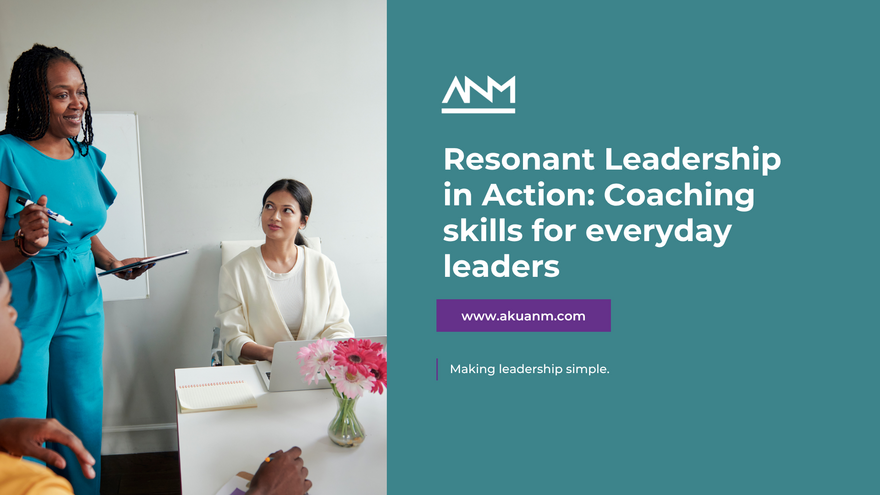Resonant Leadership in Action: Coaching skills for everyday leaders

What if becoming a better leader wasn’t about adding more to your plate, but shifting the way you think and listen?
This post is based on a conversation I had with Marie Deveaux, founder of High Tides Consulting. We had a quick and rich dialogue on how everyday leaders can bring coaching skills—not titles—into their leadership practice. Watch and listen to the entire conversation here.
Whether you lead a team or are just trying to lead yourself through a difficult season, this conversation will give you the language and perspective to rethink your leadership approach.
Coaching as Leadership: A Mindset, Not a Job Title
Marie:
Let’s talk about leadership that feels good—the kind that resonates deeply and lasts. I’ve been connecting with folks doing meaningful work in this space, and I’m thrilled to be in conversation with Akua Nyame-Mensah.
Akua:
Thanks, Marie. I currently refer to myself as a Leadership and Culture Advisor—sometimes I add in Organizational Transformation.
At the core, I provide the support I wish I had as a first-time leader. I try to make leadership simple. Whether it’s coaching, facilitation, or advising, I rely on inquiry-based approaches because I think they’re incredibly powerful.
Marie:
I love that. Coaching is often seen as separate from leadership, but to me, it’s a set of interpersonal skills every leader should have.
“If you’re human dealing with other humans, coaching belongs in your toolkit.”
How Coaching Found Me
Akua:
I got into coaching while leading a business in Lagos, Nigeria. I’d taken over from another leader and faced a lot of resistance.
Someone on the HR team suggested a coaching approach to build better rapport.
I looked into it—it was expensive, and my company said no. But I had the time and resources, so I paid for it myself.
At the time, I didn’t want to start a coaching practice. I just wanted to lead better.
Marie:
That’s what’s so powerful—you were drawn to the skills, not the title. Coaching became a mindset.
Coaching Is Embodied, Not Performed
Akua:
Coaching is something you embody. But it’s easier to tap into curiosity, openness, and presence when you’re taking care of yourself.
If you’re hungry, tired, or overwhelmed, your ability to hold space diminishes.
And it’s not about toxic positivity. Coaching doesn’t mean ignoring what’s hard—it’s about being honest about what you can and can’t control.
Marie:
Yes. Coaching also means recognizing your own limitations. Sometimes, the most powerful thing you can say is: “I’m not the best person to support you with this.”
“Leadership is also about connecting people to the right resources—not doing everything yourself.”
Multi-Stable Perception & Holding Complexity
Marie:
I’ve been writing about multi-stable perception, like the image that’s both a rabbit and a duck. It’s such a metaphor for leadership. Two people can see the same situation and experience it differently.
Akua:
Exactly. I use similar images in my sessions. They help us see that multiple realities can be true at the same time. That’s emotional intelligence.
Marie:
And that’s why coaching tools matter so much—they help us open up to complexity instead of shutting it down.
Curiosity vs. Control
Marie:
How do you see curiosity as more powerful than advice?
Akua:
Curiosity helps people find their own path. Advice can feel like you're colonizing someone’s process—especially when it doesn’t fit their context.
Asking “What’s really going on?” or “What do you think you need?” creates space for ownership and self-discovery.
“What you come up with on your own is more motivating than anything someone else tells you.”
Self-Coaching & Spotting the Signs
Marie:
What are signs a leader might need to pause and reflect?
Akua:
For high-achieving leaders, it’s often hitting a wall. Something breaks. Someone snaps. You stop loving something you used to enjoy.
Sometimes others notice before you do. For those who journal or reflect, they may catch it earlier. But for many, it’s external.
Marie:
Yes, I call it the “autopilot plateau.” Everything looks fine, but something feels off. That’s the time to get curious:
“Am I still aligned with what I care about?”
“Do I still enjoy this?”
The Goal Is to Work Myself Out of a Job
Akua:
I always say: I’m trying to work myself out of a job.
Success is when my clients can coach themselves.
And when they use those tools with their teams? That’s the ripple effect.
Marie:
That’s the dream—building sustainable, ripple-effect leadership. But it’s hard, because some clients want you to come in and “fix it.”
They want control. But what you offer is clarity, reflection, and space.
“They are the experts in their own lives. I’m just helping them see that.”
The Leadership Cycle & Seasons
Marie:
What’s one simple way someone can start developing a coaching mindset?
Akua:
I love using the concept of seasons.
Leadership isn’t linear. There are cycles—highs and lows. Some seasons are for growth, some are for rest.
Recognizing where you are helps you plan, prioritize, and focus.
If you know a “high” season is coming, what can you delegate now?
If you’re in a “low,” what can you let go of to make space?
“What season are you in—and what can it teach you?”
Ready to Lead With Curiosity?
If you're looking to build a coaching mindset, develop emotional intelligence, and support your team with more clarity and intention, you're not alone.
Interested in learning more about the support I provide? Please visit my Work with Me Page or reach out via my Contact Me form.
Leaders aren't born; they're made.
This 5-minute assessment will help you understand what leadership stage you're currently in so you can determine your next steps.
© Copyright 2023, Akua Nyame-Mensah | Terms & Conditions | Website by Rachelle Deem


0 comments
Leave a comment